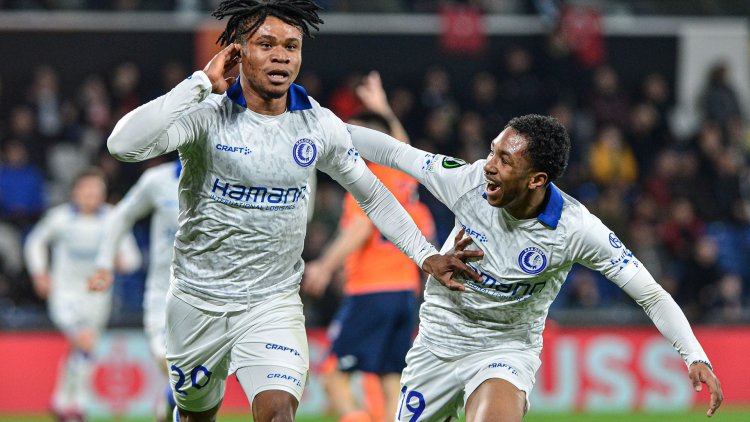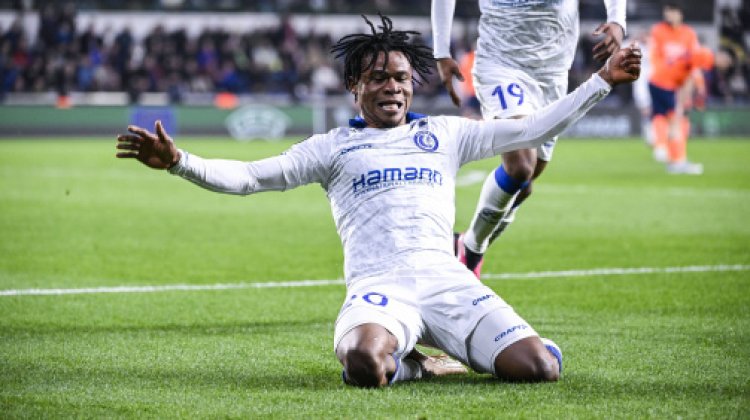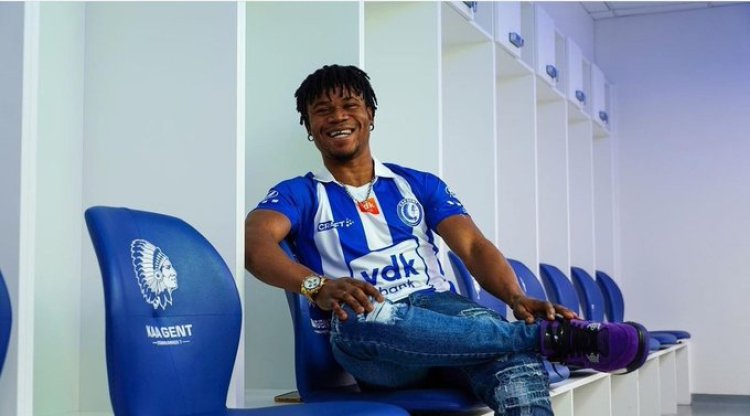The rise and rise of Gift Emmanuel Orban
With the pace he has at his disposal, he is a nightmare prospect for many defenders when the team is organised.

Super Eagles fringe player Gift Emmanuel Orban has become a goalscoring trailblazer in the past year after catching fire following a move from his home country of Nigeria to Norway’s second division.
He breezed through the ranks of Stabæk, ending his first European season as the league’s top goalscorer with 16 goals in 22 games.
Gent took the initiative this past January by acquiring the 20-year-old and have been reaping the rewards ever since. Goals have been flowing in Belgium; he pulled off a couple of eye-catching finishes on his debut, starting as he has gone on in domestic and European competition.
With Orban’s ascent up the European football hierarchy showing no signs of slowing down – another move up the European ladder is almost a certainty this summer – what makes him such an exciting prospect, and where might the rapid rise top out?
What helps make Gift such a constant threat is his lightning-quick speed. He’s often left high up the pitch in order to maximise his threat towards the space in behind, and the capacity to make runs into depth is a big asset of his.
Contesting the right channels at the right times is a problem point. As a particularly lightweight attacker, he often ducks out of the congested channels, even when he has the pace to take advantage.
Equally, he seems to lack the instinct to position himself on the blindside, to run off the shoulder, to create separations through double movements, to readjust how he angles his body on approach.

That lack of awareness highlights a similar lack of clarity to his moves towards the ball. Whilst the 20-year-old is happy to associate with play when Gent are leading, the intensity and fluidity required in Belgium has – so far – resulted in less success in access.
In contrast, his interactions off of the last line were a strength in Norway, the access was less restricted and did also feel ingrained as part of the system, which made for a lot of very advanced, clever lay-offs.
As a receiver, especially when in a bit of space, the Nigerian does a very good job of taking the ball on the turn and is keen to use his weaker foot to set himself going forward. He scans well enough in these situations to know how best to take on the ball in a positive manner, although the frequency of these touches has dwindled in the more intense circumstances at Gent.
His achilles’ heel? He struggles to withstand pressure. Not only is Orban easily outdone in shoulder-to-shoulder battles, but he doesn’t afford himself the platform to absorb pressure from behind either. He’s often too square and too upright when trying to pin a defender, struggling to keep them at any kind of distance, and without the physical edge as of yet, Orban easy to dispossess from behind.
That bleeds into a lack of confidence under pressure, possibly in line with his approach to not contesting tight channels, which means he steps back onto the ball more often and is less trusting of his chances to turn.
We can see more of how this leaks into his game when it comes to dribbling. The 20-year-old is incredibly nimble and loves to run at pace, particularly through the middle during transitions. He weights his touches well in these cases, showcasing unrelenting speed, and can change direction with ease.
What currently puts a ceiling on how effective this is, though, are the same physical deficits along with a lack of ball protection. Since Orban doesn’t tend to use his legs to shield the ball during runs, overwhelming him physically can be quite an easy task. Despite wanting to push the ball beyond opponents, he’s very quick to turn back once engaged by an opponent.
A further problem with this, beyond its wasting of good positions, is that his awareness becomes very skewed under pressure. As a result, he won’t spot a good option and will instead just look to fire at goal from range after a quick shift sideways into space.
Shot selection is often an issue, especially considering his lack of awareness when he eyes up a shot. Orban is arguably at his best when he doesn’t have to think about the chance coming his way – situations where he can just pull the trigger without letting opposition pressure factor into his setting touches.

His steady positioning, at least away from crossing situations where he lacks in similar ways to general run-making, helps him rack up a lot of these good chances late in sequences.
As a result of his lacking awareness, his passing tends to be very short-sighted. A team-mate could be a few feet away from him and he wouldn’t know, but when he has a bit of time and space to lift his head, his speed of thought and execution of forward passes is very good. His short-range elegance makes him a very capable link player, even though pinning his man to bring others into play remains a weak point.
Defensively, Gift shows great enthusiasm to help the team suffocate the opposition. He does his best to drop back and provide an additional layer of protection as well as staying aware of the options around him during presses, looking to tightly mark the players he should when his team attempts to trap them out wide.
With the pace he has at his disposal, he is a nightmare prospect for many defenders when the team is organised. However, when the team is more open, he can be picked off routinely: sometimes through easy shifts out of his cover shadow, as he only checks before moving out, other times due to a lack of technical quality, as he recklessly commits across an opponent with a ball-focussed approach. This then limits his ability to make decisive defensive actions.
Orban has no shortage of desirable qualities for a forward, but unlocking them is the key. He doesn’t necessarily have that inevitable moment or two in a match when things aren’t set for him, which is why he benefits tremendously from working in a well-drilled attacking system.
With his current physical limitations in mind, it seems as though he has the quality to ascend well into the top-five leagues but the ideal destination may be somewhat limited. Playing as a striker – or possibly even better as an inside forward – for a top Bundesliga could be hugely beneficial to his game, whereas that might not translate to more physically-demanding environments like the Premier League.




















